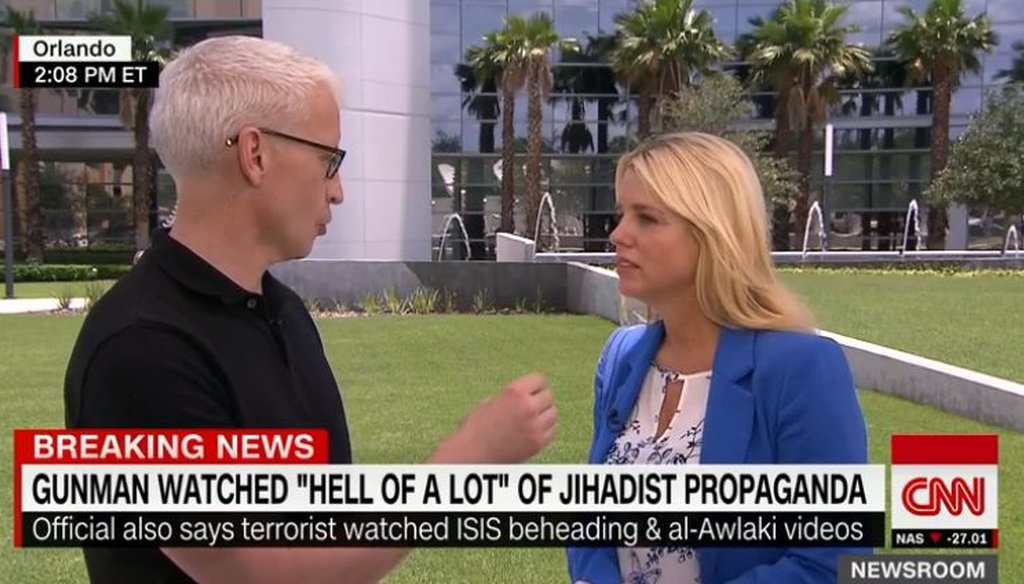Stand up for the facts!
Our only agenda is to publish the truth so you can be an informed participant in democracy.
We need your help.
I would like to contribute

This interview between CNN's Anderson Cooper and Florida Attorney General Pam Bondi went viral due to Cooper's aggressive questioning of Bondi's past stances on LGBT issues.
An interview in Orlando between CNN’s Anderson Cooper and Florida Attorney General Pam Bondi on June 14 has gone viral, due to Cooper’s aggressive questioning about her record on gay and lesbian issues.
Many social media users who shared the clip of the interview thought Bondi seemed defensive under Cooper’s pointed questioning. Cooper asked her about her opposition to same-sex marriage and what that meant to the loved ones of the 49 dead after the attack on a gay nightclub.
After the interview went viral, matters between Bondi and Cooper got testy, as both accused each other of mistaken facts and lack of context.
Ultimately, though, it appears that Cooper and Bondi have been talking past each other. We didn’t find any obvious inaccuracies about what either side was saying.
Here’s a recap.
A day after the CNN interview, Bondi went on WOR radio in New York City and criticized Cooper for how he’d handled the segment. She said he had downplayed the portion of her interview that addressed price gouging and scams targeting the victims’ families, which she said had been the intended topic of the interview. Bondi also said that "it wasn’t the time nor the place" to confront her about her past statements "in front of a hospital when we could have been helping victims."
Bondi added in the radio interview that "when he posted the clip, he cut out the entire first portion that discussed people donating to legitimate sites," Bondi said.
Later that day, Cooper fired back on his CNN show, saying Bondi had made statements "that are just factually incorrect. Now, she's either mistaken or she's not telling the truth."
Cooper noted that the interview aired live and in its entirety, and he added that his producer’s notes -- which he held up on air -- confirmed that the topic of scams was not one that had come up in a pre-interview with Bondi’s staff. Instead, he said, Bondi herself proposed the topic to him just before going on air. "Now, that's important, I said to her," Cooper said on his show. "Great, let's talk about it. … Let's lead off the interview with that."
Cooper also defended his line of questioning as part of his job as a journalist -- to hold elected officials accountable. He said Bondi’s comments after the mass shooting "seemed contradictory to her record in dealing with gays and lesbians in this state."
Cooper granted Bondi’s assertion that a clip posted at CNN.com had been shortened, at least "for a couple hours." The cuts left out her comments on scams, leaving instead the questions about her past stances on LGBT issues.
"Now, I don't control what's online," Cooper said. "I'm here on the ground. I'm told they routinely shorten interviews online for time. Frankly, I wish they had posted the whole thing immediately, which they did, by the way, later in the day yesterday, and it's now online for you to watch in its entirety."
So where does this leave us?
We’ll leave it up to readers to decide whether asking Bondi about her record on LGBT rights in front of a hospital was in poor taste, as Bondi argues, or a legitimate example of accountability journalism, as Cooper counters.
As for what the interview was supposed to be about, that’s a he-said, she-said dispute. Cooper’s argument citing his producer’s notes seem persuasive. That said, we can also understand how Bondi might not have understood the finer distinctions between what was discussed in a "pre-interview" between an aide and a producer and the exchange she herself had with Cooper before the camera rolled.
The most clear-cut claim in the Cooper-Bondi face-off is easily resolved: What happened to the video clip on CNN.com?
Though Bondi in her WOR interview incorrectly fingered Cooper as the culprit, Cooper acknowledged that Bondi was correct when she said that the version initially posted "cut out the entire first portion that discussed people donating to legitimate sites."
It’s easy to understand why this development -- which appears to have been resolved fairly quickly by CNN -- irked Bondi, because video clips are a whole lot easier to share on social media than full segments from TV.
But it’s also easy to see why CNN’s website editors made the decision to edit the clip down to its most confrontational -- and most newsworthy -- portion. That’s a matter of news judgment. It’s also not clear that posting an additional few minutes of the interview would have fundamentally changed how quickly or how far the video spread on social media.
Ultimately, both parties have credible arguments and credible defenses. While Cooper and Bondi have thrown around accusations of bad faith and false statements, it’s more complicated than that. The two parties, as we see it, are essentially talking past each other.
Our Sources
WOR radio, "Florida AG Pam Bondi Responds To Edited CNN's Anderson Cooper Interview," June 15, 2016
Daily Beast, "Anderson Cooper: Florida AG Pam Bondi Either ‘Mistaken or Not Telling the Truth,' " June 15, 2016
Miami Herald, "Anderson Cooper to Pam Bondi: I’ve never seen you speak positively about LGBT people ‘until now,' " June 14, 2016
Us Weekly, "Anderson Cooper Responds to Pam Bondi's Claims Their Interview Was Edited: 'She's Mistaken or Not Telling the Truth,' " June 16, 2016
Tampa Bay Times, "Fighting words fly between CNN's Anderson Cooper, Florida AG Pam Bondi," June 16, 2016






































